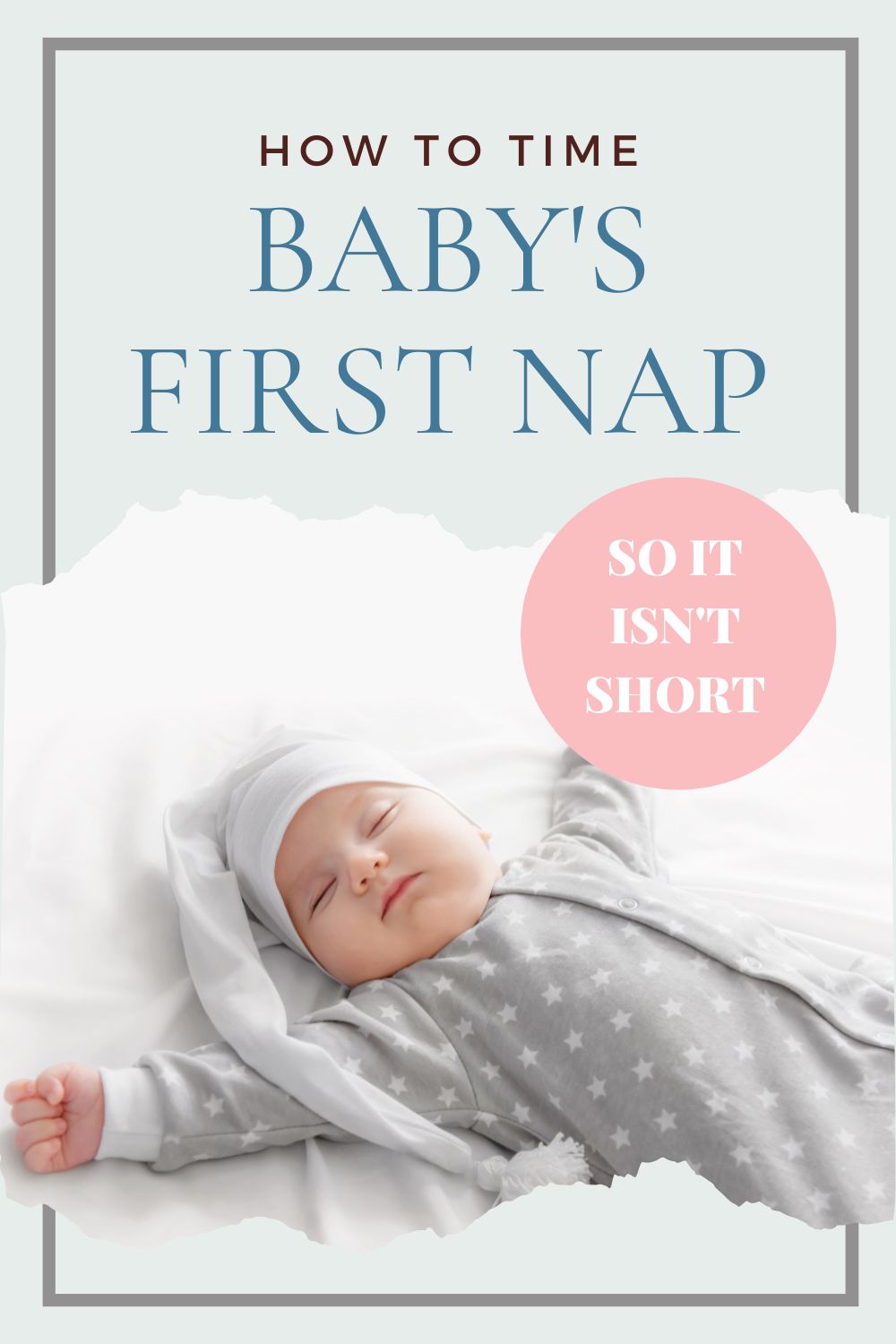The first nap of the day is the most important nap for a baby. Learn how to time the first nap so it isn’t too short and baby can take a full morning nap. Learn reasons for the short nap and what to do when baby’s first nap is short based on your baby’s age.

If your baby is taking a short morning nap, then baby’s wake windows are probably not timed correctly.
In the book Healthy Sleep Habits, Happy Child (HSHHC), Weissbluth gives a lot of details on when and how to time naps.
Many moms report following these with great success. His suggestions aren’t exactly what I land on 100% of the time, but they are close.
In the past, we have talked about The Vital Importance of the First Nap. You really need this nap to go well to set up the rest of the day.
If the first nap is too short, your second nap will probably also be short and you will find baby is not getting enough daytime sleep.
So the success of the nap is important, yes, but how? How do you time it all to get optimal sleep length? Weissbluth talks about this starting on page 121. Here are some key points.
Post Contents
Reasons for Short Morning Nap
There are many possible reasons for short baby naps. When your baby’s first nap is short, these are the most common reasons.
- Waketime length was too long before baby was put down for a nap. See Optimal Waketime Lengths for help with this.
- Baby was put down at the wrong time for the biological systems to work with the nap. Read Sleep Facts to Understand for Successful Baby Sleep for more on this.
- Baby was put down too early. Read How to Tell if Baby is Overtired vs. Undertired for help with this.
- Other activities interfere with nap (like older siblings’ activities). This can be school drop off, classes, or lessons. This can also be your work. See Managing Baby Plus Older Kids’ Activities for help with this.
- Bedtime is too late. Read Tips for Finding Your Child’s Ideal Bedtime to get this right.
- Morning wake-up time is too late. See What Time To Start Baby’s Day for help fixing this.
>>>Read: The Complete Guide to Troubleshooting Short Baby Naps
What To Do When Baby’s First Nap is Short
We have gone over the list of reasons why the first nap is short. For each reason, I have linked a helpful blog post to help you dive further and make sure that is your issue and help you fix it.
Along with those posts, here are some helpful steps you can take to get your baby sleeping well for your first nap of the day.

Baby Younger than 4 Months
If your baby is younger than 4 months old, focus on a short morning wake window.
Start nap only one hour after waking in the morning. Get your infant back in the crib or bassinet within one hour so ou get a solid morning nap.
The most common cause of baby not taking a good morning nap is because she was up too long before starting the nap.
If you want longer naps, you need shorter wake windows.
Most babies in this age range definitely do need a waketime of only 40-60 minutes.
Young newborns might be even shorter than that. You might only wake up, feed, change the diaper, and right back to bed.
Morning waketime is often the shortest of the day. Don’t be afraid to put your baby down for a nap early.
It is often said the morning nap is like an extension of night sleep. That mentality can help you feel okay about starting that nap routine so soon after waking up in the morning.
I remember when Brayden was a baby and I was putting him down for a nap. One of my good friends commented, “He takes a nap already?!?!”
A year later, she had her first baby she commented, “I thought it was crazy that he took a nap so early, but now I see that babies need that!”
It seems crazy. If feels counterintuitive. But it is normal and it is right.
Baby 5 Months and Older
Once your baby is 5 months or older, your infant will slowly add wake time length.
You won’t be at one hour as a four month old and then two hours when baby turns five months old.
Baby adds awake time in 5-10 minute increments slowly. Take the increase slowly and as baby can handle it. Do not go too much or too fast.
As time goes on, Weissbluth suggests you should start nap time between 9-10 AM if possible.
“You are willing to allow the child to become a little overtired but not become so wigged-out that he has great difficulty falling asleep”.
page 122
The nap timing will of course be dependent on what time your baby gets up. If you want to follow the advice to do nap between 9-10 AM, you will need to wake the child up around 7 AM. Then she can go down at 9 AM.
However, always follow your baby’s cues. This is especially true for a 5 month old. Not all 5 month olds can go two hours awake in the morning.
For your morning wake-up time, I would shoot for the 7 AM HOUR. So between 7-8 AM. If baby naturally sleeps until 8:30, go for it. You will get to sleep in on weekends, so that is a perk!
Remember to have bedtime about 12 hours before your morning waketime. Most babies seem to do best with bedtime in the 7 PM hour, so between 7-8 PM.
Have an early enough bedtime that the child wakes at a good time in the morning.
>>>Read: Tips for Finding Your Child’s Ideal Bedtime
Other Causes for Short Naps
There are many causes for short naps. If you have tried the suggestions this post and your baby is still taking a short nap, make sure you look at all of the possible causes for short naps.
If all naps are short, you might have a growth spurt happening. You could also have a sleep regression. Your baby might not be able to make it through a nap transition and complete a sleep cycle and needs some self-soothing skills.
You might find you need to swaddle your baby, get blackout curtains, or use white noise. You might need to tweak your naptime routine or notice sleepy cues better.
Conclusion
If you get the timing wrong for the first nap, you will have short naps all day. It can make it so the afternoon nap is not good, and then the next nap isn’t good, which leads to a cranky baby by the end of the day.
Use these tips to get longer stretches of sleep and avoid an overtired baby.
Related Posts
- An Easy Short Nap Fix that Works
- How to Finally Stop the 45 Minute Intruder
- Little One is Playing in the Crib/Bed Instead of Sleeping
- What To Do When Your Pre-Toddler is Taking a Short Morning Nap
- Sleep Routine Ideas to Get Your Baby Sleeping Well
- My Sleep Hierarchy For Newborns

This post first appeared on this blog in September 2012

